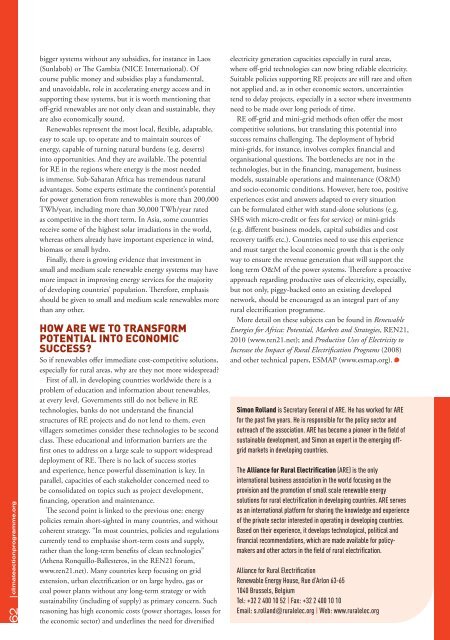Climate Action 2011-2012
Create successful ePaper yourself
Turn your PDF publications into a flip-book with our unique Google optimized e-Paper software.
62 climateactionprogramme.org<br />
bigger systems without any subsidies, for instance in Laos<br />
(Sunlabob) or The Gambia (NICE International). Of<br />
course public money and subsidies play a fundamental,<br />
and unavoidable, role in accelerating energy access and in<br />
supporting these systems, but it is worth mentioning that<br />
off-grid renewables are not only clean and sustainable, they<br />
are also economically sound.<br />
Renewables represent the most local, flexible, adaptable,<br />
easy to scale up, to operate and to maintain sources of<br />
energy, capable of turning natural burdens (e.g. deserts)<br />
into opportunities. And they are available. The potential<br />
for RE in the regions where energy is the most needed<br />
is immense. Sub-Saharan Africa has tremendous natural<br />
advantages. Some experts estimate the continent’s potential<br />
for power generation from renewables is more than 200,000<br />
TWh/year, including more than 30,000 TWh/year rated<br />
as competitive in the short term. In Asia, some countries<br />
receive some of the highest solar irradiations in the world,<br />
whereas others already have important experience in wind,<br />
biomass or small hydro.<br />
Finally, there is growing evidence that investment in<br />
small and medium scale renewable energy systems may have<br />
more impact in improving energy services for the majority<br />
of developing countries’ population. Therefore, emphasis<br />
should be given to small and medium scale renewables more<br />
than any other.<br />
How aRe we to tRansFoRm<br />
potential into economic<br />
success?<br />
So if renewables offer immediate cost-competitive solutions,<br />
especially for rural areas, why are they not more widespread?<br />
First of all, in developing countries worldwide there is a<br />
problem of education and information about renewables,<br />
at every level. Governments still do not believe in RE<br />
technologies, banks do not understand the financial<br />
structures of RE projects and do not lend to them, even<br />
villagers sometimes consider these technologies to be second<br />
class. These educational and information barriers are the<br />
first ones to address on a large scale to support widespread<br />
deployment of RE. There is no lack of success stories<br />
and experience, hence powerful dissemination is key. In<br />
parallel, capacities of each stakeholder concerned need to<br />
be consolidated on topics such as project development,<br />
financing, operation and maintenance.<br />
The second point is linked to the previous one: energy<br />
policies remain short-sighted in many countries, and without<br />
coherent strategy. “In most countries, policies and regulations<br />
currently tend to emphasise short-term costs and supply,<br />
rather than the long-term benefits of clean technologies”<br />
(Athena Ronquillo-Ballesteros, in the REN21 forum,<br />
www.ren21.net). Many countries keep focusing on grid<br />
extension, urban electrification or on large hydro, gas or<br />
coal power plants without any long-term strategy or with<br />
sustainability (including of supply) as primary concern. Such<br />
reasoning has high economic costs (power shortages, losses for<br />
the economic sector) and underlines the need for diversified<br />
electricity generation capacities especially in rural areas,<br />
where off-grid technologies can now bring reliable electricity.<br />
Suitable policies supporting RE projects are still rare and often<br />
not applied and, as in other economic sectors, uncertainties<br />
tend to delay projects, especially in a sector where investments<br />
need to be made over long periods of time.<br />
RE off-grid and mini-grid methods often offer the most<br />
competitive solutions, but translating this potential into<br />
success remains challenging. The deployment of hybrid<br />
mini-grids, for instance, involves complex financial and<br />
organisational questions. The bottlenecks are not in the<br />
technologies, but in the financing, management, business<br />
models, sustainable operations and maintenance (O&M)<br />
and socio-economic conditions. However, here too, positive<br />
experiences exist and answers adapted to every situation<br />
can be formulated either with stand-alone solutions (e.g.<br />
SHS with micro-credit or fees for service) or mini-grids<br />
(e.g. different business models, capital subsidies and cost<br />
recovery tariffs etc.). Countries need to use this experience<br />
and must target the local economic growth that is the only<br />
way to ensure the revenue generation that will support the<br />
long term O&M of the power systems. Therefore a proactive<br />
approach regarding productive uses of electricity, especially,<br />
but not only, piggy-backed onto an existing developed<br />
network, should be encouraged as an integral part of any<br />
rural electrification programme.<br />
More detail on these subjects can be found in Renewable<br />
Energies for Africa: Potential, Markets and Strategies, REN21,<br />
2010 (www.ren21.net); and Productive Uses of Electricity to<br />
Increase the Impact of Rural Electrification Programs (2008)<br />
and other technical papers, ESMAP (www.esmap.org).<br />
Simon Rolland is Secretary General of ARE. He has worked for ARE<br />
for the past five years. He is responsible for the policy sector and<br />
outreach of the association. ARE has become a pioneer in the field of<br />
sustainable development, and Simon an expert in the emerging offgrid<br />
markets in developing countries.<br />
The Alliance for Rural Electrification (ARE) is the only<br />
international business association in the world focusing on the<br />
provision and the promotion of small scale renewable energy<br />
solutions for rural electrification in developing countries. ARE serves<br />
as an international platform for sharing the knowledge and experience<br />
of the private sector interested in operating in developing countries.<br />
Based on their experience, it develops technological, political and<br />
financial recommendations, which are made available for policymakers<br />
and other actors in the field of rural electrification.<br />
Alliance for Rural Electrification<br />
Renewable Energy House, Rue d’Arlon 63-65<br />
1040 Brussels, Belgium<br />
Tel: +32 2 400 10 52 | Fax: +32 2 400 10 10<br />
Email: s.rolland@ruralelec.org | Web: www.ruralelec.org












